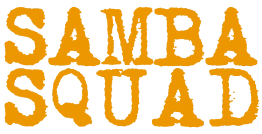SULTAN OF SAMBA
Award-winning percussionist Rick Lazar is an innovator in the vibrant world music scene
LAKEHEAD ALUMNI MAGAZINE | SUMMER/FALL 2019 | by Bonnie Schiedel
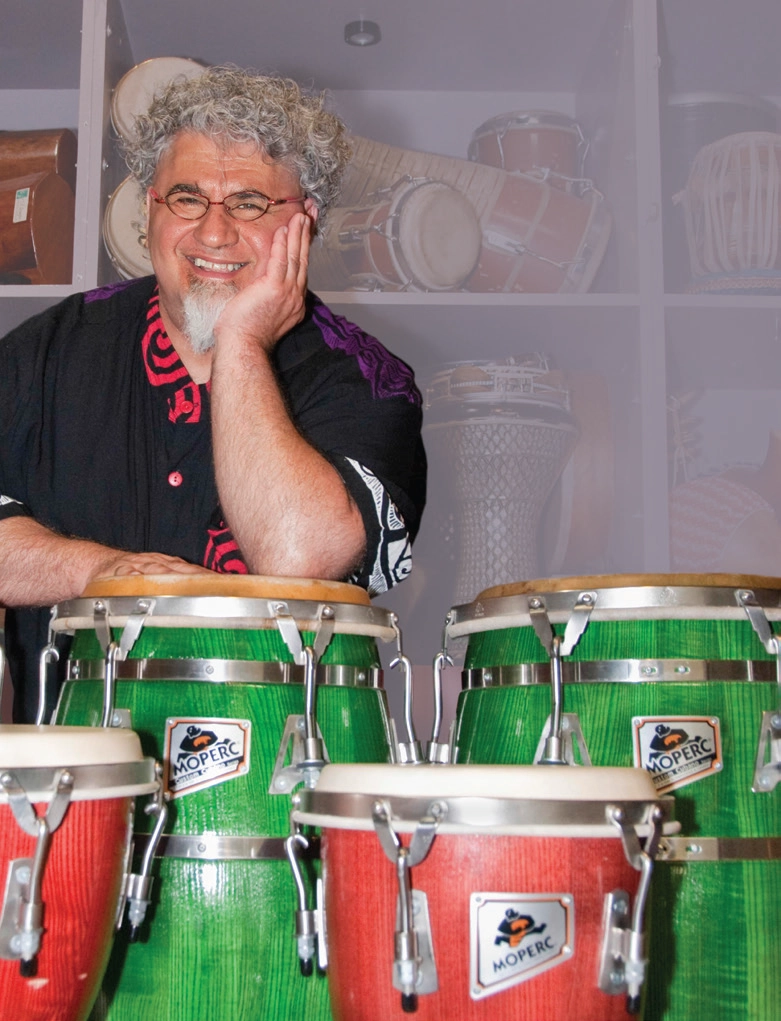
“Every day, I wake up and get into it. Music draws you in and demands your attention,” says Rick Shadrach Lazar, who has been a career musician ever since he was a teenager in 1960s Thunder Bay.
The founder of several innovative, Juno-award-nominated musical groups, his work with percussion and drums pulses with the heat of Afro-Latin-New World fusion and the cool rhythms of North American jazz. Rick is also a music educator and co-owner of a Toronto creative studio.
Creating the Beat for more than 50 Years
Pop music dominated the radio in the 50s and 60s, but at home, the Middle Eastern music his parents favoured thrummed through the rooms and hallways.
“Arabic music affected me a lot because it’s heavy on the rhythm and they use a lot of quarter tones,” says Rick, who is of Assyrian descent. His first music teacher was his dad, who played in the city band and taught him clarinet, saxophone, and piano. “When he practised tenor sax I was always
amazed at the sound coming out of his horn.”
It was natural that as a high school student, Rick would play sax in the high school band and in his own band, The Fugitives. As chance would have it, Rick befriended another teenager who would make his mark in the music world. Before Paul Shaffer was the leader of The World’s Most Dangerous Band and a fixture on David Letterman’s late night talk shows, he was a fellow student at Thunder Bay’s Fort William Collegiate Institute.
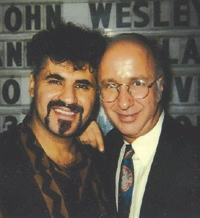
Rick was in Grade 10 at Thunder Bay’s Fort William Collegiate Institute when he asked schoolmate Paul Shaffer to join his band. Hearing him play I knew he was special and very talented,” says Rick.
One day in the school music room after hearing Paul play the song Pipeline, 14-year-old Rick said to 13-year-old Paul: “Wanna jam?”
They played until the custodian told them it was time to lock up. For the next fi ve years, Rick, Paul, and their Fugitive bandmates rocked the house every weekend at Friday night dances at area high schools and Saturday night parties at the Fort William Gardens. When the drummer quit, Rick took over. “We played the hits on the radio and I would fi gure out the drum parts,” he says. “That’s how I learned. We played the music the kids wanted to dance to.”
In his autobiography We’ll Be Here for the Rest of Our Lives, Paul describes his friend Funky Ricky: “A year older, a decade hipper, Rick was the edgiest junior high schooler in Thunder Bay.” He remembers how Rick could simultaneously play a sax and smoke a cigarette.
Rick also introduced him to the music of blues guitarist Michael Bloomfield and harmonica player Paul Butterfield, and the first piece of equipment that got unloaded at gigs – Rick’s Beatles boots. “Funky Ricky understood the importance of putting the fashion in the funk,” Shaffer recalls in his book.
The local DJs who hosted Saturday night parties at the Gardens often gave Rick access to the sample 45s they didn’t want to play on the radio—mostly songs by Black R & B artists. He can still remember the fi rst time he heard James Brown sing “Papa’s Got a Brand New Bag.” “It was so exciting—his voice, the energy, the rhythm was so raw. It opened up a whole new vision for me. Bang, I was just woken up!”
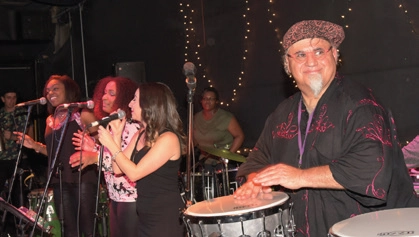
“Your emotions change with your experience,” Rick says. “In the beginning, you’re very excited and can’t wait for the performance to begin – excitement mixed with a degree of nervousness.”
In Rick’s first year as a history student at Lakehead, The Fugitives played a lot of gigs there. “On breaks we had to go start the car so it wouldn’t freeze.” The group disbanded when Paul went to university in Toronto and Rick started another band called Who Cares? On the academic front, Rick believes that Lakehead gave him the opportunity for a hometown university education that otherwise would have been out of reach.
“A year older, a decade hipper, Rick was the edgiest junior high schooler in Thunder Bay.” ~ Musician Paul Shaffer
“University gives you the discipline to tackle assignments and get things done,” Rick says. “It helps your writing skills. The research teaches you how to think, how to figure out things.”
After graduating from Lakehead, Rick headed to Indiana University to study percussion, playing with the school’s acclaimed University Jazz Band. He also did side gigs, in particular, with The Screaming Gypsy Bandits, who blended rock, folk, and world music, and he toured as a percussionist with Barry White’s Love Unlimited Orchestra. In the late 70s he moved to Toronto and started making connections and contacts through live performances and studio work. He founded another group, dance band Coconut Groove, in the early 80s, which was a key player in the emerging world music scene. “We were doing world music before the term ‘world music’ was a thing,” he says. Another group he founded, Montuno Police, grew out of Coconut Groove in 1987 and is still playing today, having earned a Juno nomination for their 1995 CD – Touch. “We started off as an Afro-Cuban-Latin jazz group, and now we’ve become a global jazz group, using Brazilian and Arabic influences.” Rick plays a dizzying array of instruments – Afro-Cuban percussion instruments (congas, bongos, timbales, shekeres, cajon), Afro-Brazilian instruments (repinique, surdos, tamborim, caixa), and Arabic instruments (darbouka, riq).
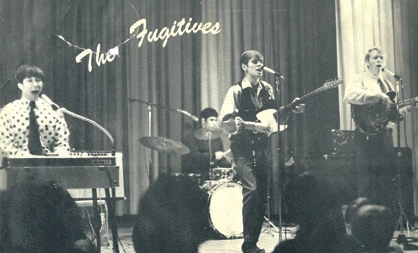
Rick was 12 years old when his musician father taught him to play his first instrument, the clarinet.
Establishing his own groups, starting way back with The Fugitives, has always been a source of creative satisfaction and professional pride. “When you’re playing for other people, you don’t want to force your vision on to someone else’s. You’re there to do your best for their project. With each of those groups I created, it was my vision, and we’ve been successful.”
Fellow band member Gord Sheard, pianist and main composer for Montuno Police, has known Rick for nearly 30 years and says there are a number of factors that contribute to that success and set Rick apart as a musician. “First of all, he’s got a lot of skills together. He’s got really good technique on his instruments—he’s a virtuoso percussionist. He researches a lot of styles from different parts of the world really deeply and he’s got
this broad knowledge of musical genres, mostly from the African diaspora but also the Middle East and India and other places, that we combine together,” he says. “He comes up with a lot of interesting ideas based on his vast knowledge.”
Rick’s leadership also makes his groups a success. “He’s really good at seeing what somebody can do and finding a way of making that part of the band. His ego isn’t threatened by that in any way,” Gord says. Rick is a pro at engaging with the audience too. “He’ll encourage them to sing along,
clap, all that showmanship that is part and parcel of a show. I’ve mentioned all these world grooves that he uses, but he also introduces elements of funk and rap, genres that are familiar to the audience, and that tends to engage them. He’s also a great guy!”
Rick’s other long-time group, Samba Squad, is celebrating its 20th anniversary. Made up of as many as 30 professional and non-professional percussionists, it blends samba, salsa, soca, funk, and reggae to wow audiences. Rick, the creative director and founder, says the band is a microcosm of cosmopolitan Toronto. “We’ve got people from all walks of life. There’s this connection between people who wouldn’t normally meet
each other, who enjoy each other’s company and become friends.”
In addition to building up his own groups, over the years Rick has worked with Loreena McKennitt on five albums, including her Juno-winning album The Visit, and a variety of other Canadian and international artists ranging from Bruce Cockburn, The Blues Brothers, Moe Koffman, and Jesse Cook to Jane Bunnett, Jeff Healey, and Great Big Sea.
Rick met his business partner, Gili Zemer, when she joined Samba Squad 20 years ago. They soon decided to start a company as owners of Geary Lane, a soundproof studio space where Samba Squad could practice (not many landlords want to rent to 30 percussionists) as well as rent out the space to other creative professionals for film, music, and events.
“We were doing world music before the term ‘world music’ was a thing.”
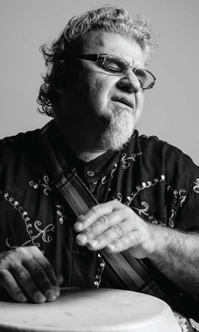
“As you gain experience and become a professional, your highs and lows balance out but you still aim for the joy
that a wonderful performance brings.”
“Rick is the most incredible person to go into business with,” she says. “He has great business sense and he’s a great person to bounce ideas off. He always provides really wise advice in very simple terms. When you sit down with him and talk about a situation that might seem to be complex in your head, he just somehow is able to distil it to: it’s either this or that. And then you’re like, you’re right. That’s his charm.” Through Samba Squad, Rick also gives group lessons to corporations and school groups and has developed workshops for kids called Samba Kidz and Samba Teens.
Adding music education to Samba Squad was a logical decision, as Rick taught music at Humber College for a number of years and has been a music instructor at York University since 2002. “I teach Percussion and Latin Ensemble Performance. They’re hands-on percussion courses. There are no exams—you have to learn the rhythms with whatever instrument you’re playing, whether it’s the big drums (surdos) or the agogô bells or the tamborim. You get marked on your attendance and your improvement over the term. It’s fun. You have to mould them into a cohesive ensemble by the end of the year. The goal is to perform at the spring World Music Festival organized by York University.”
Teaching keeps you close to a younger generation, Rick says. “It keeps you fresh. They bring their energy to the group. It’s like recycling the energy. That’s a great thing.” What’s next? More music education, more festivals, and popup street concerts all over Toronto. The beat goes on!
Latest Gigs
No events are found.
Latest News
 CBC Radio InterviewMay 4, 2024 - 7:38 pm
CBC Radio InterviewMay 4, 2024 - 7:38 pm Our 25th Anniversary CelebrationMay 4, 2024 - 7:29 pm
Our 25th Anniversary CelebrationMay 4, 2024 - 7:29 pm 25th AnniversaryMay 2, 2024 - 1:49 pm
25th AnniversaryMay 2, 2024 - 1:49 pm Radio InterviewMarch 30, 2024 - 1:22 pm
Radio InterviewMarch 30, 2024 - 1:22 pm
